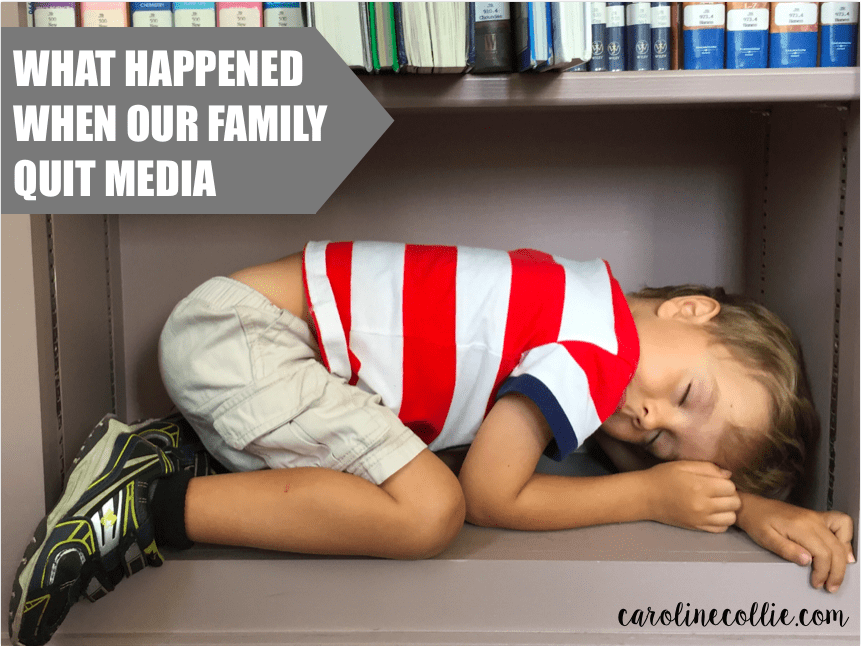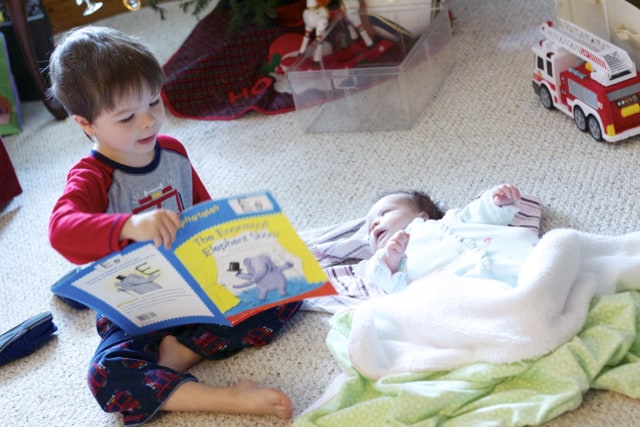After Quitting Media
Recently I’ve been chatting about the experience of “quitting media” for a while as a family, and this post continues the story. You can read the part one here and part two here.
Boats hummed by, skimming the Pamlico River in the distance. Cicadas occasionally erupted in a chorus in the trees nearby. Birds and dragonflies flitted about and we watched their aerodynamics show as conversation ensued.
It was Sunday night, our children were bathed and brushed and “pajamaed”, and with kisses and prayers, they were in bed. We fed the baby monitor through the kitchen window so that we could hear, and then sat outside with a cold drink, and just talked for about two hours. At the end of those two hours, I felt very relaxed, and very excited about the plans we’re discussing, the ways we are trying to plan and think and be very intentional in living our lives and raising our children.
An hour and a half or so of conversation, side-by-side staring at the river in the distance isn’t an entirely unusual thing for us these days (although it used to be). It is always a breath of fresh air.

When we arrived at the end of our 40 day media fast, we had to decide what the best path was for our family moving forward. After observing all the positive results of unplugging, we knew we wanted to carefully choose a very limited amount of screen time for ourselves and for our kids, so that we wouldn’t fall back into the pattern of consuming and consuming without a second thought.
After lots of trial and error, I’ve discovered that if I don’t make a hard, fast and firm rule for my kids, they can talk their way into just about anything. (This principle often applies to me, too.) And if I don’t stick with the rule and hold to it in an almost-no-matter-what-this-is-the-deal stance, they observe the weak links in the chain and immediately set about to exploit them.
For example, if I say the kids aren’t allowed to watch anything during the week, but then suddenly cave and suggest they watch something to give me some breathing room and help me achieve something on a rainy, stormy, Tuesday afternoon, you can be sure that the next Tuesday will roll around and we’ll have a conversation like this:
“Mom, can we watch something?”
“No buddy, it’s Tuesday.”
“But last Tuesday, remember you let us watch an episode of Wild Kratts because…”
I’ve learned my lesson. Blurry boundaries are hardly there at all. And blurry boundaries tend to look a lot like slippery slopes for falling back into old habits at our house.
We arrived at this conclusion, so these are the rules we’re sticking to, to the best of our ability, regarding media.
The TV Rules for Our Kids
1. No TV for children during the week.
Yup. We ripped it off like a bandaid. On a special occasion, or for a special reason, and always with very clear communication that this is a special treat, there are times when the weekday TV ban is lifted for an hour. It’s pouring rain and they’ve already played their hearts out indoors and there are still two hours until dinner. I give. But for the most part, they know what to expect when it’s Tuesday and they have a hankering for an episode of Wild Kratts. I simply say, “Buddy, it’s Tuesday!”
2. Limited TV on the weekend.
Friday afternoon is when the TV ban usually gets lifted, but that doesn’t mean the TV stays on from 3 pm to bedtime. I might let each child choose one episode of something when everyone is up from nap time, but then I’ll encourage them to get back outside, or do something else. Saturday morning is when we’re the most relaxed, and we will let three or four episodes of this or that show run, and usually the first two happen while I’m transitioning from the comfort of my own bed to making breakfast. But after a certain point, (I think 4 episodes is probably my subconscious limit) it’s time to turn off the TV for a while and find something else to do.
Saturday afternoon or evening, when everyone is awake from nap, there might be the opportunity for one or two more episodes of something, or if we call it a family movie night, we’ll all sit together on the couch with popcorn {do yourself a favor and get a Popcorn Popper like this!} and enjoy something as a family.
The Other Screen(s)
1. Time during the week on “other screens” is very limited — there’s almost none.
2. Weekend “Other-Screen” Time is also limited.
The only other media we have to reckon with at the Collie house is my old MacBook, which has been transferred into the kids’ possession, mostly. They enjoy playing games on the PBS Kids website and on the National Geographic Kids site. The Nook our eldest was gifted for his birthday a while back has all but given up the ghost, so we don’t have to regulate that time anymore, and we don’t have any games on our phones or on HH’s iPad that would make those devices something the kids would ask about.
Screen time for computer games is mostly limited to weekends. If they’re having trouble sharing, the laptop gets shut and computer time is done.
One other thing our eldest really enjoys doing is looking at maps online. Google’s interactive world map allows him to scroll to Madagascar and examine the lay of the land, and then decide he wants to find Athens and Sparta, since we’ve been talking about those places for a while in history.
While to me the map is wonderful learning time, to him it’s still a “special treat.” One the weekend, if he asks for screen time, I typically ask whether he has read books yet that day, and ask if he’s done anything creative, like drawn a picture, worked on a story, etc. Once he has done some of those other things, he can have typically have 30 to 45 minutes to look at the map or play a game on one of the “approved websites”. If it’s during the week, all of his schoolwork will need to be done before he’s allowed to have map time, and I usually suggest one more little assignment (two pages of cursive, for example) that he ought to do before he has screen time during the week.
Other screen time, for computer games and fun websites, is usually limited to the weekends. Similar to the TV regulations, I will occasionally bend the rules, but only after making sure other, more constructive things have happened first. It’s also clearly communicated this is a special treat, so that it’s clear that it’s not “our new normal.” I won’t allow an hour of screen time and an hour of TV time back to back, even on the weekends, so I’m usually paying attention to what’s going on and making sure when the timer goes off (our oven usually does the trick) the device goes off, too, and something more constructive is done for a while.
The Grown-up Media Rules (Because We Need Them.)
We do not watch TV during our children’s waking hours, and we typically turn on the TV once during the week after they’ve gone to bed. Wednesday is often our “Mid-week weekend” where we might pop popcorn and watch a movie just the two of us — and that is especially nice for us since we’re wedding photographers and our Saturdays are sometimes work days. But other than an occasional decision to relax with This Old House or a movie — as long as we can get in bed close to a reasonable hour — we have been reading much more often before bed.
We’re more lenient with our TV time on the weekends, but as we’ve been focusing on reading both for education and for pleasure so much, I often have a book I’d rather dive into than turn on a screen. In total, I’d guess we watch an average of one movie and one episode of a TV show, in total, each week. And that really feels like the best thing for us.
Why do I need Media Rules?
I have discovered that media has had this strangely attractive, addictive pull on me. I’m willing to admit it. I love a good story. When the LOST series was coming out, and we lived in South Africa, I couldn’t get to the free internet spots fast enough to download our weekly fix when it became available for download. Even here in the States, with free seasons of a LOT of TV available at our fingertips, I used to feel the pull to just watch one more episode of Parenthood or whatever else we’re interested in, even though I needed to head for bed.
I want to know what happens!!!
But is it really profitable for me?
Once we decided to change our habits, instead of rushing into finding something to entertain us for the evening, I’ve found that we often enjoy just talking. We find out how the other person is doing, listen to what’s on each other’s mind. We spend time discussing decisions we need to make, upcoming events and opportunities, and things we’d like to do around the house.
I also feel at leisure to step outside and take a peek at my garden. And wowzers, growing stuff can be really life-giving. And when I give less of my time to entertainment, I have more time to give to good stuff like that!

The golden hours — after the kids are in bed and it’s just the two of us — have long been neglected for the two of us. We were together in the evenings before, but there was often a screen garnering our full attention.
I’ve shared before about how good it is to regularly ask purposeful questions like these of your spouse, and to spend time caring for one another and discussing the answers. Now that turning on a screen for entertainment is less a part of our routine, we are naturally asking more of those important questions on a regular basis — the ones that normally get set aside because there are urgent things that have to be discussed.
Overall, our intentional decision to slow down and reduce the media consumption in our family has been incredibly life-giving. We are getting to bed at a reasonable time, waking up feeling like we’ve had a good nights’ sleep, and helping our kids become more creative with how they spend their time when they’re not being entertained. {If you’re interested, comment to let me know and I’ll discuss some of the ways I’ve been helping them learn to entertain themselves sans media in another post!}
Although I know these rules won’t work for every family, and may not be realistic in many situations, I think the important thing to have in mind is a standard of some sort, so that you’re not blindly consuming media, or allowing your kids to do so, without so much as a nod to how much of your day (and therefore your life) you’re giving away to entertainment.
I read this quote in Tsh Oxenreider’s Notes from a Blue Bike recently. (This is a good read, by the way. I’m reading SO much more now and it is so life-giving and good!)
“The cause of most of man’s unhappiness is sacrificing what he wants most for what he wants now.”
— Gordon B. Hinckley
Are we sacrificing the things we want most — a sense of togetherness as a family, a healthy relationship with our spouse, or even just a more restful and productive lifestyle where we use the finite time we have wisely — for the temporary rush of entertainment?
It’s worth switching off the screens long enough to at least start asking how often is too often when it comes to switching them on.
Have you thought about your media consumption recently? Tried a fast? What do you think?
xCC






 I create resources to help people find deeper, more meaningful relationships with God through pursuing, pondering, and prayer. The "Shop" link above will take you to the home of many of the lovely resources I’ve created to help you keep walking one day deeper with Jesus.
I create resources to help people find deeper, more meaningful relationships with God through pursuing, pondering, and prayer. The "Shop" link above will take you to the home of many of the lovely resources I’ve created to help you keep walking one day deeper with Jesus.